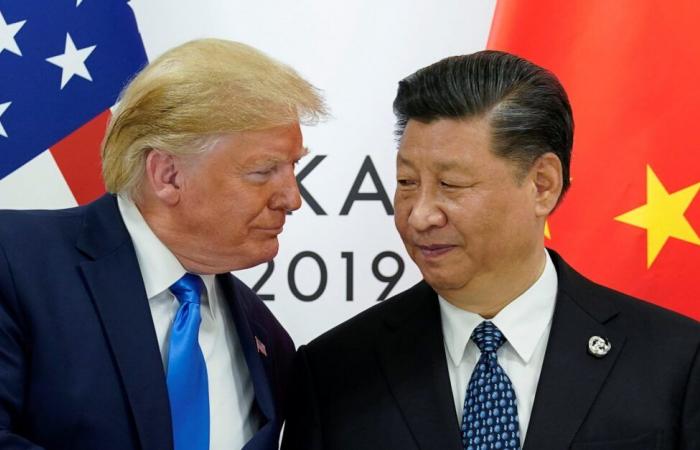In recent years, Morocco has become an attractive destination for Chinese industrial investments, particularly in strategic green technology sectors, due to the free trade agreement that Morocco signed with the United States in 2004.
In a context marked by the re-election of Donald Trump, who firmly opposed the rise of China on the world market, this investment dynamic raises questions about the future of Sino-Moroccan relations and the implications of these on economic agreements between Morocco and the United States.
A response to American protectionism
With the re-election of Donald Trump, American trade policy is expected to tighten further towards China. Trump had already initiated a series of countermeasures to limit the entry of Chinese products into the United States, causing significant impacts on Chinese exports. In response, Beijing has begun to diversify its strategies to circumvent US trade barriers, opting for direct investments in strategic countries with which Washington has free trade agreements. Morocco, thanks to its partnership with the United States, is in a privileged position to become an export platform to the American market.
Read also | USA: Harris concedes defeat, pledges to help in transfer of power
Indeed, several Chinese companies specializing in the production of batteries for electric vehicles and in critical materials necessary for the energy transition have announced their intention to invest massively in Morocco. These investments, estimated at nearly 10 billion euros, aim to establish production units for components for electric batteries, most of which are intended to be exported to the United States. Morocco thus becomes a central element in China’s “friend-shoring” strategy, a concept which consists of establishing commercial exchanges between friendly countries or countries linked by economic agreements, in order to circumvent protectionist barriers.
Converging interests of Morocco and China
The Inflation Reduction Act (IRA), passed under the Biden administration, is a $400 billion plan to promote clean technology and reduce carbon emissions. The plan, by offering tax credits for electric vehicles made with non-Chinese components, has prompted China to rethink its sourcing strategy. To stay in the race for Western markets, Beijing is investing in “friendly” countries, likely to guarantee it indirect access to the American market.
Morocco, due to its solar and wind energy resources and its growing industrial expertise, is becoming a partner of choice for China. By establishing themselves in Morocco, Chinese companies could obtain preferential access to American tax credits, while benefiting from the skilled workforce and Moroccan production framework. This alliance also strengthens Morocco’s ambition to become a key player in green industry in Africa.
Moroccan issues and the re-election of Donald Trump
Trump’s re-election could, however, call this Chinese strategy into question. Known for his protectionist approach, Trump could consider further restricting the IRA by changing the conditions for access to tax credits for products imported from countries where China has significant economic interests. If Trump were to impose new restrictions, Chinese investments in Morocco, although beneficial for the Kingdom, could lose part of their attractiveness for exports to the United States.
For Morocco, such a scenario raises significant challenges. On the one hand, Chinese investments bring notable benefits to the country in terms of job creation, technology transfer and strengthening of the local value chain. On the other hand, growing tension between the United States and China could force Morocco to reassess its strategy of attracting foreign investments, in order to preserve its commercial and diplomatic relations with the United States.
Geopolitical implications for Morocco
Morocco’s positioning as a privileged partner of both the United States and China demonstrates its desire to balance its relations to maximize economic opportunities. However, this position could become difficult to maintain if Sino-US relations continue to deteriorate under the Trump administration. Trump’s foreign policy, focused on competition with China, could lead the United States to exert pressure on its economic partners, including Morocco, to limit Chinese investments.
Read also | Moscow, Paris, Beijing… congratulations rain down on Donald Trump after his election
In this context, Morocco could be forced to adopt a more subtle and proactive diplomacy to navigate between the two powers. On the one hand, it must continue to attract Chinese investment, essential for the modernization of its industrial infrastructure. On the other hand, it must avoid compromising its strategic partnership with the United States, which offers it valuable commercial and diplomatic advantages, particularly for accessing the North American market.
And the ambition of Moroccan industrial autonomy?
Despite potential tensions between Washington and Beijing, Chinese investments represent a major opportunity for Morocco to strengthen its industrial autonomy and develop a robust manufacturing base. Establishing production centers for battery components and other green technologies could enable Morocco to become a key player in Africa’s green economy. By developing local skills and strengthening its production capacities, Morocco could prepare to export to other markets, even if trade agreements with the United States change.
In addition, the alliance with China would allow Morocco to benefit from new technologies and advanced manufacturing techniques, crucial elements for modernizing its industrial fabric. In the event of tightening conditions for access to American markets, Morocco could also redirect part of its production towards Europe and other regions, capitalizing on its strategic geographical position.
Towards increased industrial cooperation
Beyond batteries for electric vehicles, industrial cooperation between Morocco and China covers several sectors of the future, including aerospace, renewable energy and transport infrastructure. These sectors, which are highly strategic for Morocco, already benefit from Chinese expertise and investments, which contribute to the increase in the skills of local human resources and the diversification of the Moroccan economy. This dynamic could strengthen in the future, despite the uncertainties linked to American policies.
Chinese projects in Morocco are also part of a logic of sustainable development, in line with the Moroccan industrial strategy aimed at reducing energy dependence and developing environmentally friendly infrastructure. China provides Morocco with essential financial and technical resources to realize this vision of sustainability and inclusive growth.
Faced with uncertainties, the diversification strategy
Morocco finds itself in a delicate, but strategic, position at the crossroads between two competing global superpowers. Chinese investments in Morocco, in response to Sino-US trade tensions, illustrate how the Kingdom can leverage its free trade agreements with the United States to attract foreign capital. However, with Trump’s re-election, the persistence of this strategy could be called into question.
Faced with this uncertain context, the Moroccan strategy of economic diversification and promotion of foreign investment seems more crucial than ever. By continuing to strengthen its local industry, attract investments from various partners and develop balanced economic diplomacy, Morocco can hope to maintain its stability and growth, while consolidating its position as an industrial leader in Africa.






